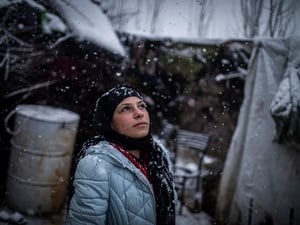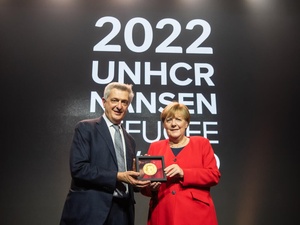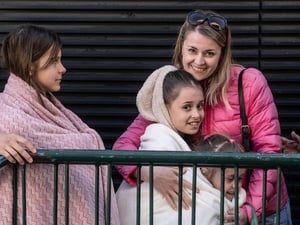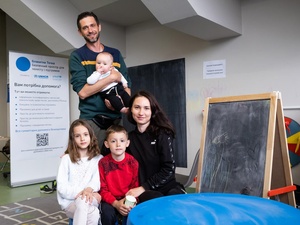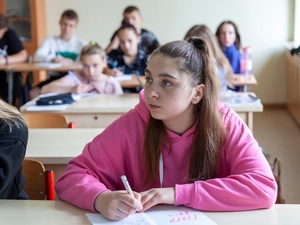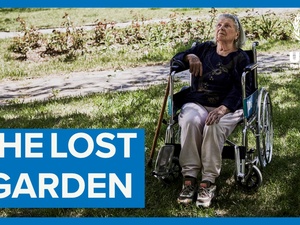Refugees and migrants face high risks in winter weather in Europe
Refugees and migrants face high risks in winter weather in Europe

Refugees wrapped in blankets and winter clothing cross the border from the Former Yugoslav Republic of Macedonia to Serbia in freezing temperatures in January 2016.
We are deeply worried at the situation of refugees and migrants faced with harsh winter conditions across Europe. We have stepped up our assistance in several countries, including Greece and Serbia. Saving lives must be a priority and we urge States authorities across Europe to do more to assist and protect refugees and migrants.
In Greece, we have transferred hundreds of people to better accommodation in Lesvos, and Chios over the past few days. However we are deeply worried at the situation of some 1,000 people, including families with young children, who continue to live under unheated tents and dormitories in Samos.
Our distribution of winter items across Greece, including on the islands, continues, with close to 360,000 items given out, including high thermal blankets, sleeping bags as well as winter boots and clothes. The delivery of humanitarian aid carried with partner organizations is coordinated with the Ministry of Migration Policy. We reiterate our call to further accelerate procedures on the islands to allow faster transfers to the mainland, where better accommodation is available.
In Serbia, over 82 per cent of the 7,300 refugees, asylum-seekers and migrants living in the country are now accommodated in heated government shelters. However, we are concerned at the situation of some 1,200 males who still stay rough in inadequate informal sites in Belgrade city centre, including up to 300 unaccompanied or separated boys. Over the past weeks we transferred roughly 1,200 people to designated government shelters, including 190 over the last few days. As a life saving measure, we continue to provide heaters, blankets and winter clothes to residents of informal sites who have not yet agreed to move to government centres. We urge the authorities to continue their efforts to expand emergency shelter capacities, with particular consideration to the specific needs of unaccompanied children.
Meanwhile, UNHCR is extremely concerned by reports that several refugees and migrants have lost their lives trying to enter or move across Europe, including five since the beginning of the year, due to the freezing weather.
On 6 January, the bodies of two Iraqi men were found in southeastern Bulgaria after they had crossed from Turkey. They are believed to have died from the effects of the cold and exhaustion. In the same region of Bulgaria, early January, the body of a young Somali woman was found by the authorities. Two Somali teenagers travelling with her were hospitalized with frostbite after five days in a forest in extreme cold. The Bulgarian authorities have reinforced patrols in the area since to prevent fatalities due to the weather.
At the Greece-Turkey land border, on 3 January, a 20-year-old Afghan man died of complications resulting from exposure to the extreme cold after crossing the Evros River at night when temperatures were below -10°C.
We reiterate our call to increase safe pathways for the admission of people in need of protection, including via resettlement, family reunification, private sponsorship and other mechanisms to provide a viable alternative to irregular movement and reliance on human smugglers.
Given the harsh winter conditions, we are extremely concerned by reports that authorities in all countries along the Western Balkans route continue to push back refugees and migrants from inside their territory to neighboring countries. In several cases, refugees and migrants have alleged that police have subjected them to violence. Many have also reported that their phones were confiscated or destroyed, thus preventing them from calling for help once stranded. Some even reported items of clothing being confiscated thus further exposing them to the harsh winter conditions.
These practices are simply inacceptable and must be halted, as they place the lives of refugees and migrants at heightened risk and violate their most fundamental rights. For those that are unwilling to seek asylum States must provide them with the option of safe and dignified return instead.
We are also deeply concerned at the abuses perpetrated against refugees and migrants by criminal gangs, including kidnapping, physical abuse, threats and extortion. We urge European states to enhance their efforts to tackle these criminal networks and ensure the safety of refugees and migrants.
For more information on this topic, please contact:
- In Geneva, Cécile Pouilly, [email protected], +41 79 108 26 25
- In Geneva, William Spindler, [email protected], +41 79 217 3011
- In Geneva, Babar Baloch, [email protected], +41 79 513 95 49
- In Greece, Roland Schoenbauer, [email protected], +30 69 48 088 544
- In Serbia, Mirjana Ivanovic-Milenkovski, [email protected], + 381 63 275 154


